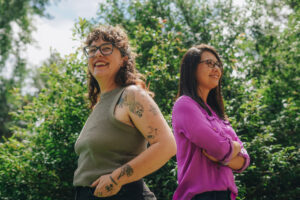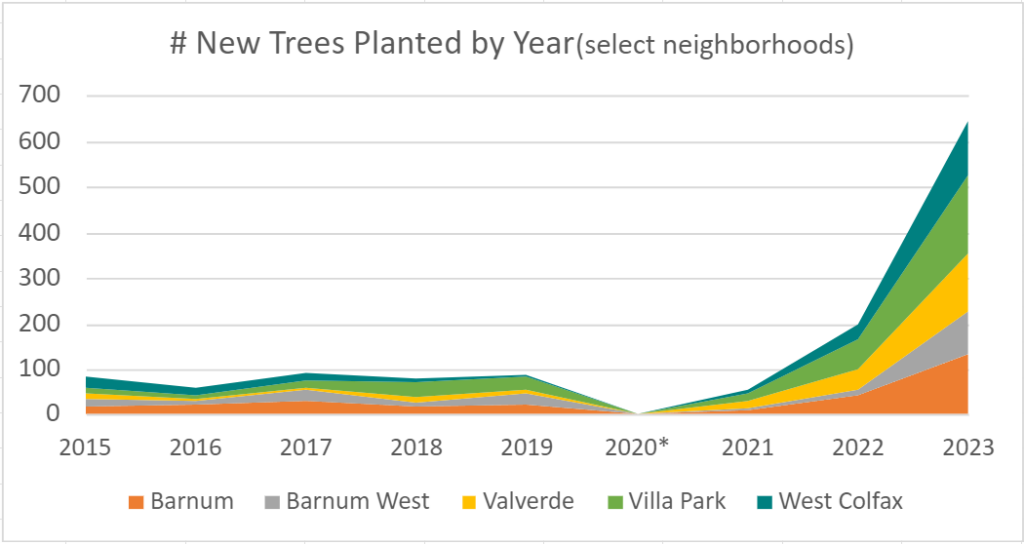Danielle Helm lives on a bustling street in Denver’s Barnum neighborhood. It’s a long, sun-drenched stretch that offers no shade to the many who rely on its busy bus line. In the 90-degree summer heat, people walk several blocks in the blazing sun only to wait at a bus stop, also with no shade. By the time they get to work, they’re drained, and then they face the same grueling journey home.
Neighborhoods like Barnum are experiencing disproportionate effects of climate change. Residents endure higher temperatures due to the lack of trees and green spaces that provide natural cooling. The conditions not only deter exercise or socializing outdoors, impacting well-being, but they also pose serious health risks, particularly for those who are already vulnerable.

The Park People, a well-known nonprofit for its urban forestry work, is aiming to change that. The Park People has been a cornerstone of Denver’s efforts to create healthier, more resilient communities through planting trees and improving parks. It works with low-income communities and those disproportionately affected by extreme heat, pollution, and other environmental hazards. Today, its programs span urban forestry, workforce development, and community building, with collective action at the heart of its approach.
“More than 80% of our plantable spaces and 80% of our existing tree canopy are on private property. So, it’s really a whole community effort to care for this shared powerful piece of green infrastructure that makes our community healthy,” says Kim Yuan-Farrell, executive director of The Park People.
In the last five years, The Park People has started working on deeper community engagement. Its built out programming, like Community Connectors, that elevates resident leaders and works in partnership with communities. It was through this program that Danielle Helm first learned about The Park People. Helm has been a community organizer for years, working to support her neighbors and the place she calls home. When she saw a flyer for the Community Connectors program, she saw an opportunity where she could be provided the support and resources to lead and engage her neighborhood toward a more sustainable future.
Helm was hired as a Community Connector to help The Park People bring trees into low-canopy neighborhoods and help reduce the barriers. “It’s hard for people in my neighborhood,” says Helm, adding, “Just taking time off work to go pick up a tree, and taking time to plant a tree. It’s too much.” The Park People knows people understand the value of trees and want them, but also know time, language, and financial resources can often stand in the way.
“If you don’t have A/C, and if you’re in these largely paved areas without green cover, then you are experiencing climate change in a really intense way,” says Yuan-Farrell. “Folks understand that intensity – they feel it, and so it’s just a matter of lowering those barriers and helping it feel doable.” 
Through Community Connectors, The Park People experienced a noticeable shift in engagement with its tree-planting initiatives as residents began to see themselves more reflected in the work.
“When we brought in Community Connector leadership, that number has just skyrocketed,” says Yuan-Farrell. “It speaks to the power of having local leaders who are trusted. Residents know these leaders have an interest in their neighborhood because they are neighbors who also live there.”
Helm’s role as a Community Connector goes beyond educating residents and providing resources. It’s about responding in the moment. It’s about showing up continuously—letting someone borrow a wheelbarrow when theirs has broken or helping someone weed their yard when they’re experiencing health issues.
“We have to act like a tree with roots that are all connecting, talking to each other, and taking care of each other. That’s how they survive so long,” says Helm.
This commitment to sustained and meaningful support through Community Connectors is reflected in The Park People’s other programs, where residents know it’s there for the long run and that they can ride out challenges together. “Gertie Grant is the founder of our Denver Digs Trees program, and she said it’s through community forestry work that ‘people get connected to the earth, and they get connected to their neighborhood, and they get connected to each other. It’s that community building process that strengthens the neighborhoods and strengthens the cities,’” says Yuan-Farrell.
- Yuan-Farrell, executive director of The Park People
For Helm, being part of The Park People has allowed her to contribute to her community and helped her build self-confidence. “All the things about me that I feel like I’m trying to change to fit a job are the things they like about me. It’s just so cool for me to build my confidence, and that I’m an asset to my neighborhood,” she says.
With the support of The Denver Foundation and its donors, The Park People can continue to remove the barriers to accessing green spaces, adapt our urban areas to be more resilient, and support residents in leading the way in transforming their neighborhoods. The Denver Foundation has supported The Park People since 1996 through several independent fundholders. More recently, with the addition of climate and environmental priorities to the foundation’s strategic plan, the foundation has provided support through the Community Grants Program—its signature funding strategy supported by a permanent endowment.
Photos courtesy: Armando Geneyro
